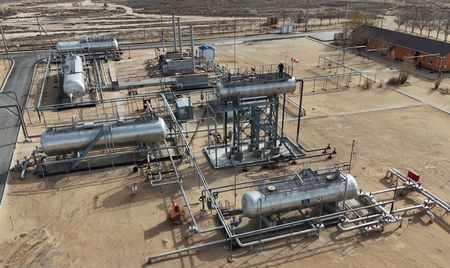By Gayatri Suroyo and Stefanno Sulaiman
JAKARTA(Reuters) -Indonesia’s central bank held policy rates steady for a third consecutive review on Wednesday, as expected, aiming to maintain rupiah exchange rate stability amid global trade tensions.
Bank Indonesia kept the benchmark 7-day reverse repurchase rate, known as BI Rate, unchanged at 5.75%, as expected by all but two of 26 economists polled by Reuters. It also kept its two other policy rates steady.
The rupiah hit a record low earlier this month and the stock market plunged amid capital outflows triggered by the U.S. announcement of reciprocal tariffs for countries including Indonesia, though they have recovered somewhat after President Donald Trump announced a 90-day tariff freeze.
BI, which has had to balance market uncertainty with concerns about Indonesia’s growth outlook, said the U.S. tariff policy and China’s retaliation has heightened global uncertainties.
Governor Perry Warjiyo said the rate decision was in line with efforts to safeguard the rupiah’s stability while it continue to assess future room for a cut, taking into account the country’s inflation rate and growth prospects.
“Our short term priority is exchange rate stability. Once stability is maintained, the room for a rate cut will be more open and that would be the time to decide on future interest rate policy,” Warjiyo said.
The rupiah strengthened slightly to 16,860 per dollar after the decision was announced, versus 16,880 before, but has still depreciated more than 4% so far this year.
He said BI is not only committed to maintain stability, but also to support economic growth.
BI said on Wednesday it expects this year’s growth for Southeast Asia’s biggest economy to be slightly below the mid-point of its outlook range of 4.7% to 5.5% while forecasting global economic growth to soften due to the trade war.
“Despite macro indicators pointing to a need for rate cuts, markets are likely to price out easing this quarter as the rupiah continues to underperform on the back of domestic and tariff uncertainties,” DBS economist Radhika Rao said.
She predicted rate cuts totalling 50 basis points later in the year “when the tariff dust settles”.
The sharp drop in rupiah earlier this month had prompted BI to intervene in offshore non-deliverable forward on top of intervention in domestic markets to support the currency.
BI continued to intervene in the offshore NDF market since then, Warjiyo said.
The central bank has previously said it has room to cut interest rates, citing low inflation. The annual inflation rate has stayed below its 1.5% to 3.5% target range so far this year, with March’s rate at 1.03%.
Indonesia has sent a delegation to Washington to negotiate tariffs. Finance Minister Sri Mulyani Indrawati said if the U.S. keeps its planned 32% tariff for Indonesian exports, it could reduce growth potential by 0.3 to 0.5 percentage points.
Some economists have said the direct impact from U.S. tariffs to Indonesia’s economy may not be as big as the hit some other countries might be exposed to, but any Chinese economic slowdown could hurt Indonesia more.
China is Indonesia’s biggest trade partner and a major source of investment.
(Reporting by Stefanno Sulaiman, Gayatri Suroyo, Fransiska Nangoy and Bernadette Christina; Editing by Martin Petty and Kim Coghill)








